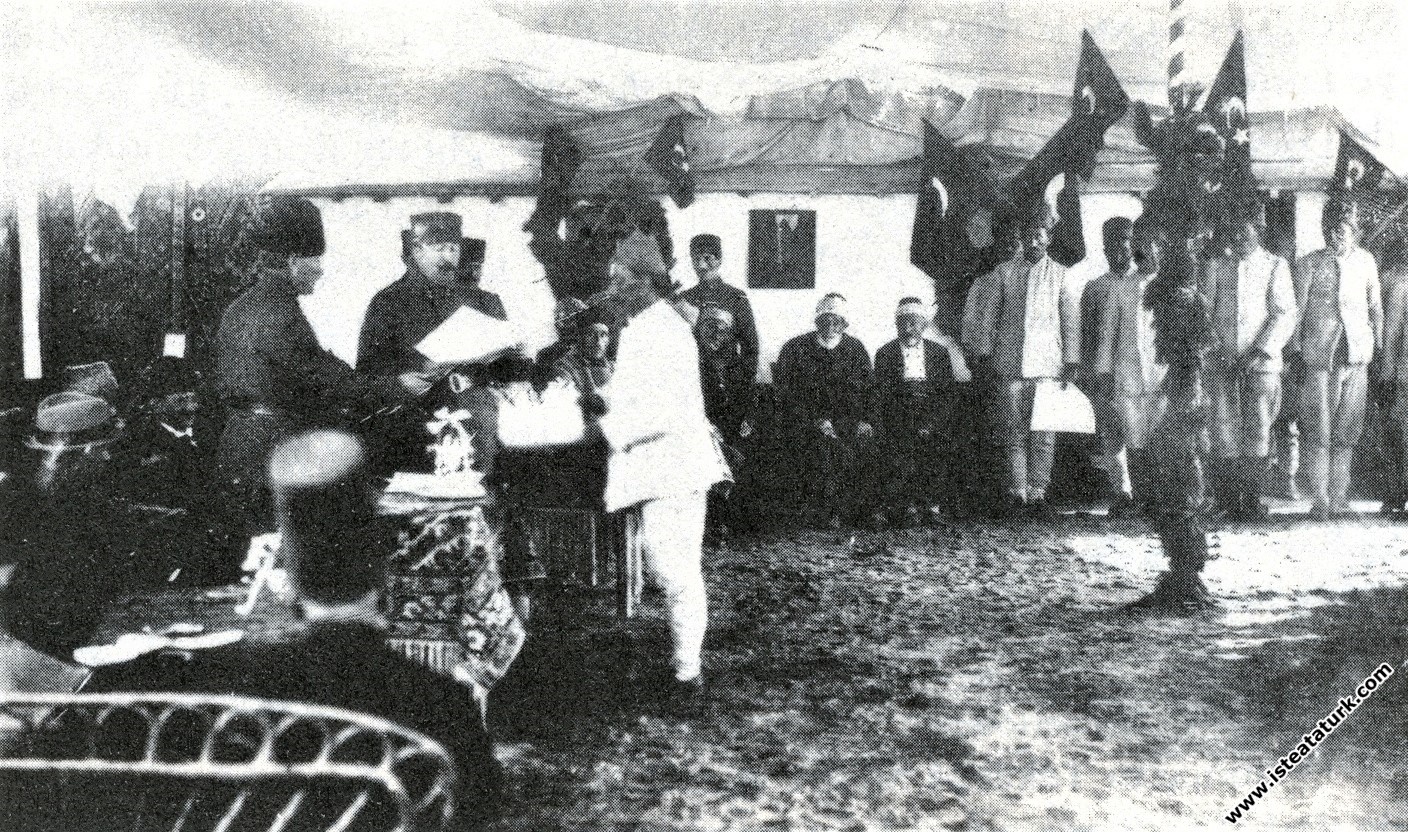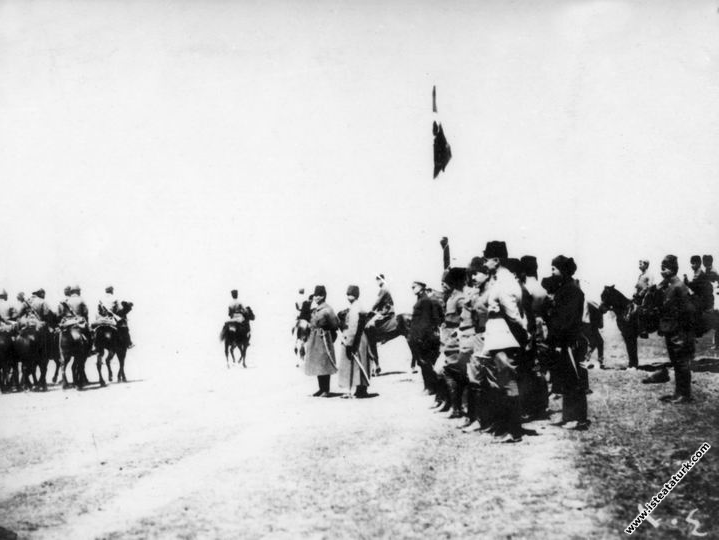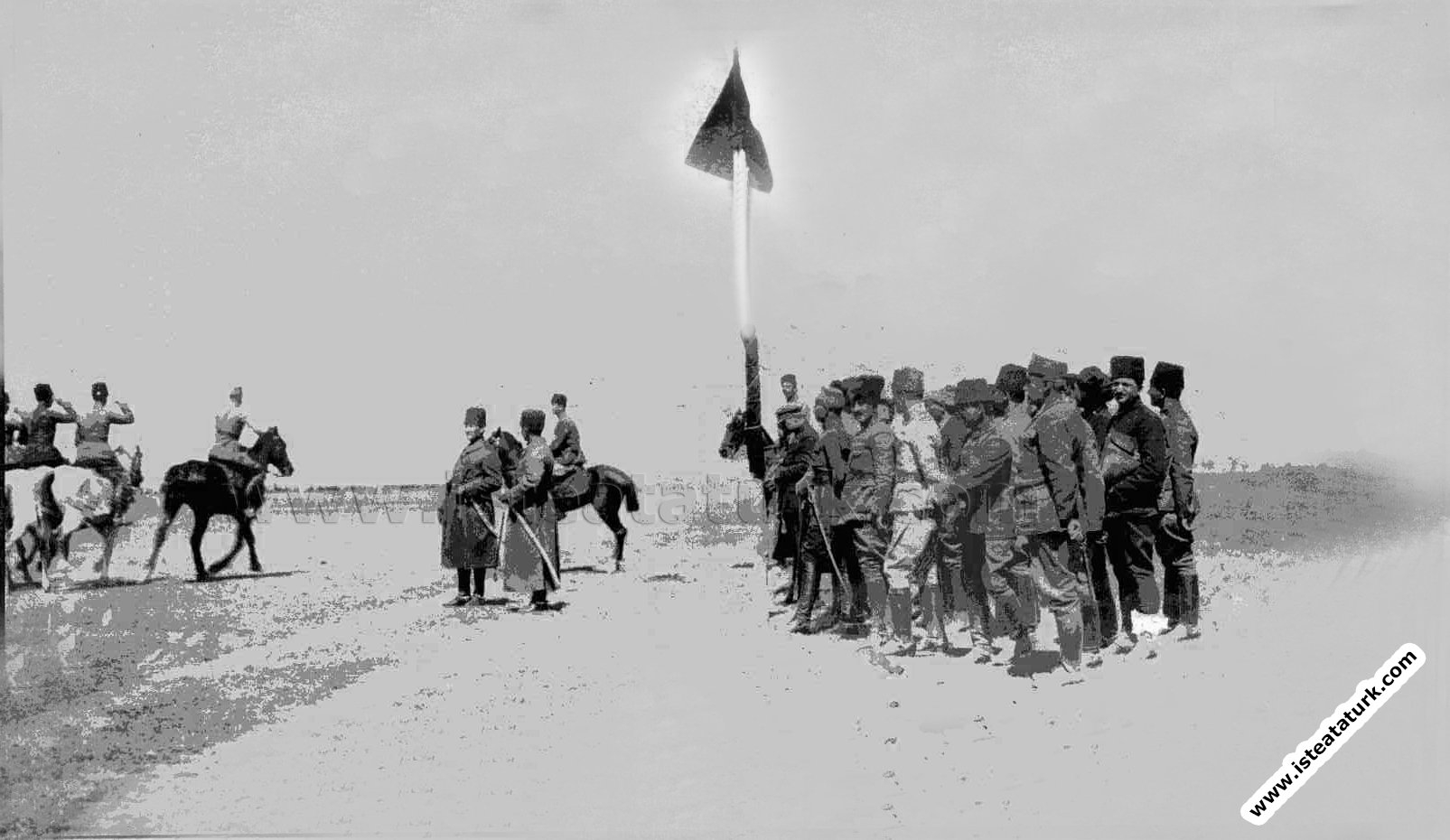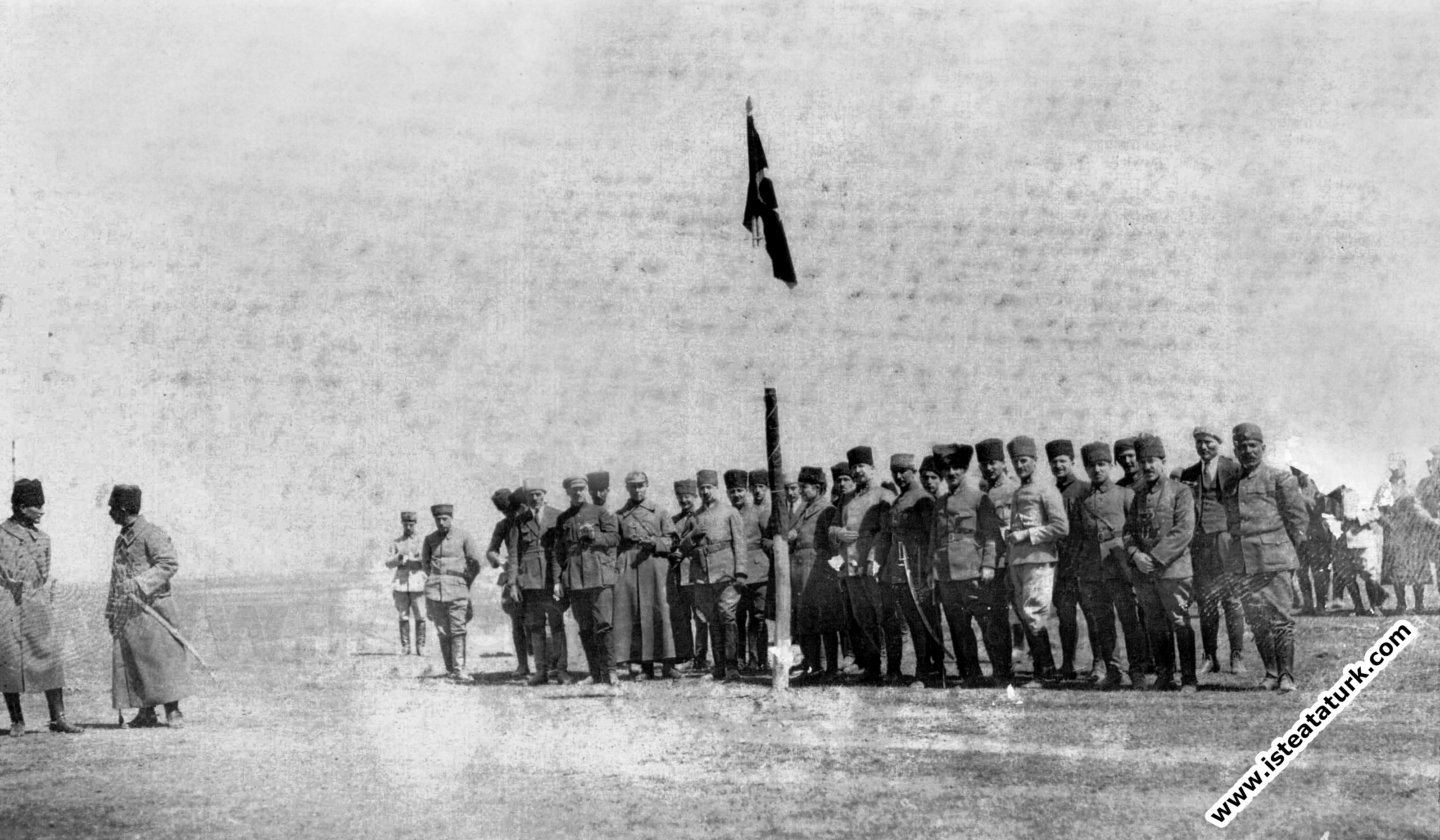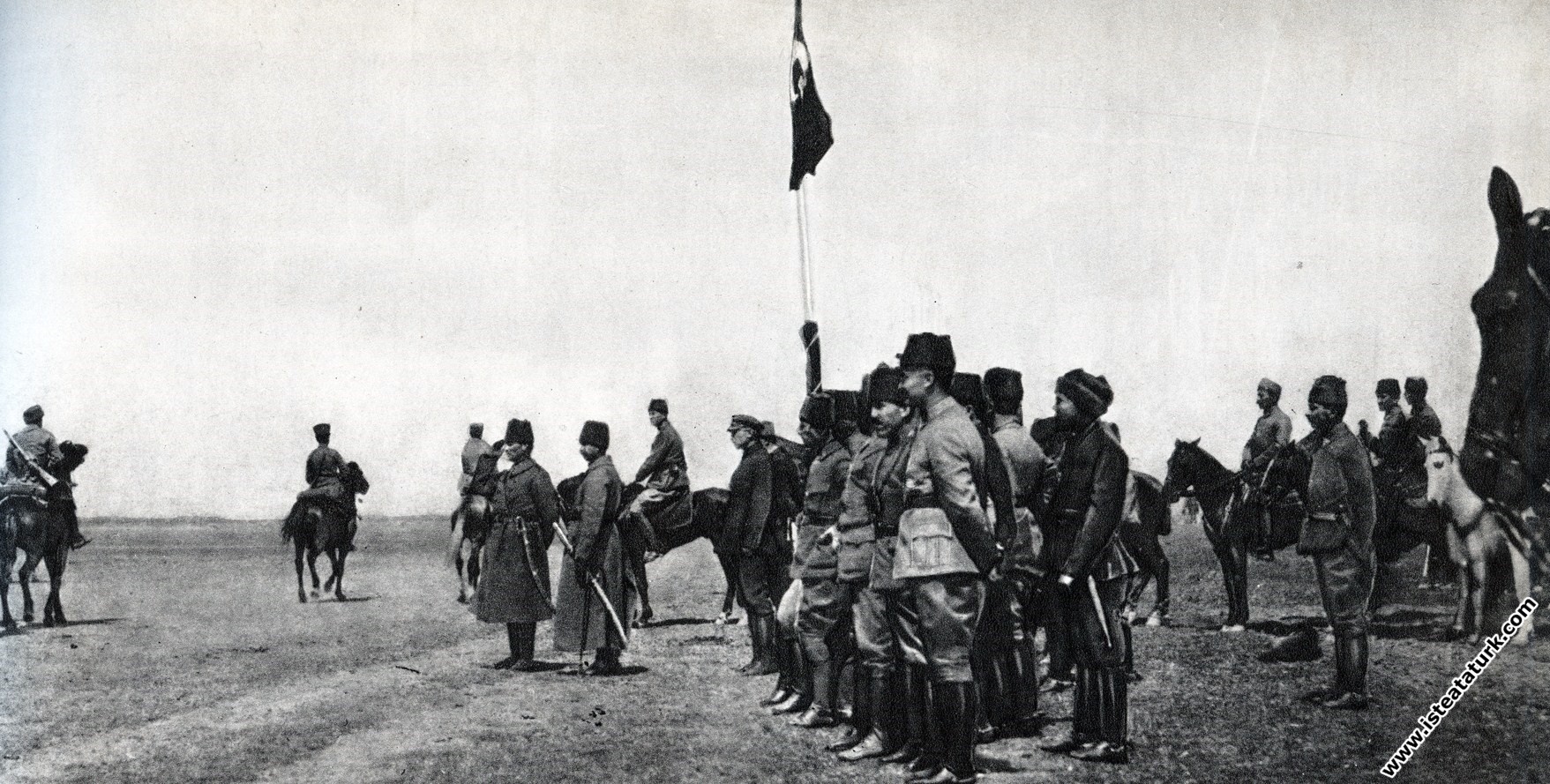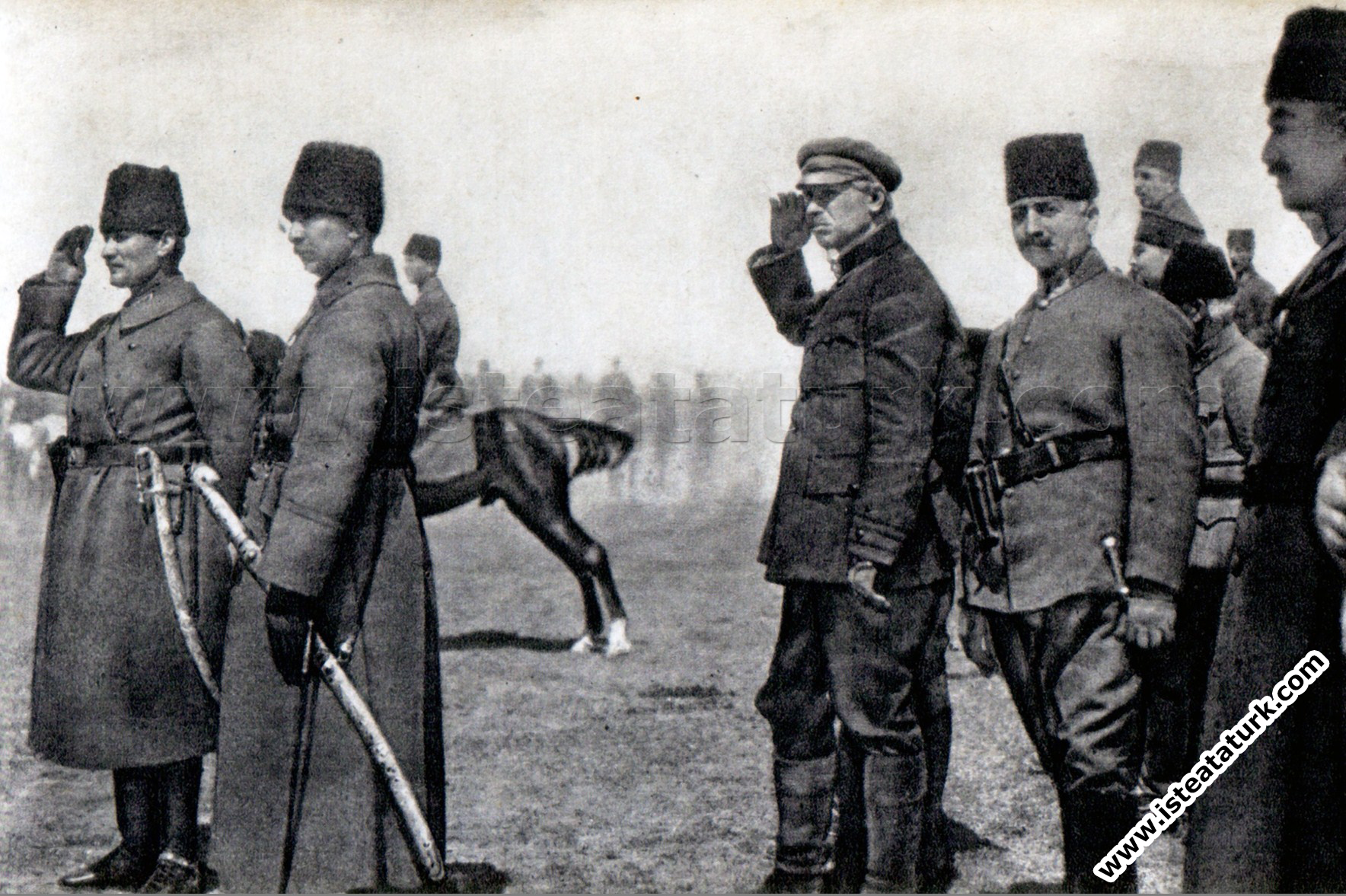Mustafa Kemal at the graduation ceremony of the students of Konya Farrier School. (03.04.1922)
Mustafa Kemal at the graduation ceremony of the students of Konya Farrier School. (03 April 1922)
Mustafa Kemal Pasha in Konya Farrier School, April 3, 1922
Between April 1 and April 4, 1922, the most critical year of the War of Independence, Commander-in-Chief Mustafa Kemal Pasha came to Konya after inspecting the front. In these dates, the preparations for the Great Offensive were also intense. Konya Farrier School was about to give its first graduates. The Farrier School, which gave education in an inn close to the Hakimiyet-i Milliye Primary School in today's Samanpazarı district, was of great importance for the Turkish army; The school also undertook the production of horseshoes and studs. On the entrance door of the school, which was eagerly prepared for the graduation ceremony to be attended by the Pasha, "Art is a gold bracelet-The worker's sweat is blessed-Steel armies get their strength from industry-Working is worship." Inscribed signs were placed and the surrounding was decorated with flowers. A huge horseshoe hung in the middle. A tent (canopy) decorated with flags and pine branches was set up in the courtyard of the school, carpets were laid out and chairs were placed in the canopy. Kazım (Dirik) Pasha, the Konya Range Inspector, greeted Mustafa Kemal Pasha and his entourage in the square, accompanied by a band, and took them to the courtyard of the school.
The ceremony started with Kazım Pasha's speech:
“Gazi Pasha, venerable masters! The need of our army brought this art home to the body in June last year. He trained 60 blacksmiths during a 4-month course (ed. in Eskişehir) and delivered them to the army in the heated moments of the Sakarya Battles. In this second course, he trains 50 artisans and sends them to our army. Although it is mentioned in the testimonies of fact that there are four months, they encountered fire and anvil during the whole winter and day and night. This establishment, which trains blacksmiths as blacksmiths and blacksmiths, manufactured and trained nearly half a million horseshoes and needles for our army in nine months.”
Kazım Pasha also mentioned in his speech that students are taught to read and write at the Blacksmith School.
Then, Mustafa Kemal Pasha came to the podium with enthusiastic applause and started his speech.
“Sirs!
If the Turkish nation is investigated in its original root and after that, in its financial periods with its movements and activities, it can be seen that the ordinary social life of our nation and the art of military service were found together. The nation would naturally do all the necessities of this art by accepting the necessities of their life and work. It can be said that the social delegation of the nation was in the form of an army delegation.
There is no doubt that the needs of this army and this delegation were made by the hands of the people and the labor of the people. Of course, it was not ordered to foreign factories, foreign craftsmen. But the Ottoman Turks, after conquering Istanbul and Rumelia, admitted that they were satisfied with the necessary social needs of their lives. They left this matter in the hands of the foreign elements with whom they came into close contact. They could only boast of enduring the hardships of long victories and acquiring the honor of the undying heroism of the vast battlefields. For them there was no art other than this heroic art. Or they would consider it against their honor to engage in other art.
If I am not deceived in my memory, one of the greatest Ottoman sultans, who was at the head of a large Ottoman army marching from Belgrade to Vienna, needed an artist. Finding it was a big deal. Finally, one of the men came out. However, the sultan was saddened by this incident and the presence of an artist in the army. The Sultan was of the opinion that the entry of artists into the army would damage the strength of the army.
It was the widespread domination of this mentality that, as a result, left the Ottoman army and nation ignorant and incapable of providing all their needs, from needle to thread, from horseshoe to nail. He made the nation pay tribute to meet their needs. With this understanding, the necessity of art, the importance and honor of artistry, of course, could not be evaluated.
Lords! Art is necessary in order to be able to benefit from the fertile lands, endless virtues, and various and rich resources of our country without needing anyone, and therefore to keep our nation happy and prosperous, and our army fully fulfilled and strong.
The simplest of art is the most honorable. Shoemakers, tailors, carpenters, saddlers, blacksmiths, blacksmiths are artists worthy of respect and honor in our social and military lives.
I'm really happy to be in an arts institution today, to see this institution present its second crop to the army. Special thanks and congratulations to those who helped create this institution.” 1 , begging the importance of the Farrier School.
According to the opinion of the Pasha, it was necessary to learn and practice all other professions, such as the blacksmith's profession, in order to keep the Turkish nation happy and prosperous, and the Turkish army completely free of need and well-being. The most honorable of art was the simplest. Shoemakers, tailors, carpenters, saddlers, blacksmiths, blacksmiths were craftsmen worthy of the most respectful and dignified position in social and military life.
After Gazi's speech, which was completed with applause, all the furnaces in the school began to work, and the newly graduated farriers began to make shoes and nails. All the stalls were visited one by one. Two horses were then brought into the yard; Karamanlı İzzet, second in school, and Abdullah from İnebolu, second in school, shoved these horses quickly. Other students who were waiting to receive diplomas also took their places. After giving the first and second students their diplomas and one hour as gifts, Gazi Pasha said:
-"Dear Masters! Today I am touched with deep joy and happiness when I give you these diplomas. From here you will join our army and do your national service. I believe our army will be proud of you. The army will be very pleased to have masters like you. I wish you many more."
Russian ambassador Aralof was also among the delegation that visited the school. Aralof's words while presenting his diploma to a newly graduated master created great excitement among those present:
“I hope that the first horse to set foot in Izmir will be shod by you.” The speech of the Azerbaijan Ambassador İbrahim Abilof reflected the graduation enthusiasm in the Nalbant School in the best way: “The institutions I have visited so far have always been created out of nothing, like the organization I saw (The Blacksmith School). A nation that creates out of nothing and has the power to topple mountains with a needle has of course ensured its independence and future… Long live free and independent Turkey! Long live his heroic soldiers!” 2
Source: 1. Babalık, sayı: 363
2. Mehmet Önder, Atatürk Konya’da, Atatürk Araştırma Merkezi, Ankara, 1989, ISBN:9751601614
